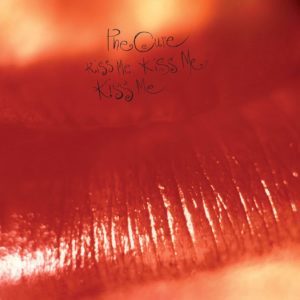Marketplace
2013 Rhino Records PRESSING
- Catalog Number R1-60737
- Release Year 2013
- Pressing Weight 180g
- # of Disks 2
- Jacket Style Single
- Original Release Year 1987
- Original Label Fiction Records
- Country U.K.
- Original Catalog Number FIHX 13
When listening to this album I think of this band or music:
I think of all the indie bands the Cure influenced: The XX, Interpol, the Smashing Pumpkins, the Shins, Death Cab for Cutie, and more. The list is long.
Music from this album would be a great soundtrack to this movie:
Noah Hawley of FX’s “Legion”directs Aubrey Plaza playing a small-town Midwestern preacher’s daughter who winds up in 1980s London as part of student-exchange program. She falls in love with a musician and it changes her life.
Kiss Me, Kiss Me, Kiss Me, the Cure’s seventh studio outing, is a huge canvas comprised of 18 tracks spread across four sides. The band seemingly uses everycolor in its collective paint box to fill the considerable space. There’s gloomy Cure, poppy Cure, noisy Cure, and even some upbeat funk thrown in for good measure. You could call the record uneven, but it’s also reasonable to claim that the diversity makes for a more interesting and nuanced presentation. Kiss Me, Kiss Me, Kiss Me is certainly not as cohesive, melodic, or as well-recorded as The Head on the Door. Nor is it as richly dark as Faith, and it’s certainly not as relentlessly nihilistic as Pornography. Overall, it covers a panorama of relationships while retaining a unifying theme: Singer and composer Robert Smith’s notion that love can raise you up to the heavens and then, just as easily, smash you into the rocks below.
Co-produced by British engineer David M. Allen, whose stamp can be heard on a variety of 80s bands like Human League and Depeche Mode, Kiss Me, Kiss Me, Kiss Me teems with splash and shimmer. In addition to bringing synthesized string and horn tracks forward in the mix and using tons of studio echo, Allen and Smith apply gate effects on drum tracks to such a degree that it sometimes sounds like Boris Williams’ sticks are hitting metal garbage-can lids in an alley. The approach fits a cut like “Why Can’t I Be You?” but muddies “The Kiss” and turns downright fatiguing on others (“Shiver and Shake”). Production missteps aside, Kiss Me, Kiss Me, Kiss Me contains a number of transcendent moments. With its ethereal, cascading guitar lines and clever couplets, it would be hard to find better-crafted heartbreak pop than “Just Like Heaven.” The emotional atmospherics of “Icing Sugar” and “A Thousand Hours” also remain worthy of inclusion on a number of movie soundtracks. While some sections would benefit from judicious editing (“The Snakepit”), the album works best when experienced in two installments. Sides one and two are made for the darkest days, and sides three and four feel tailored for when the sun begins to shine.
Alas, the 2013 Rhino edition of Kiss Me, Kiss Me, Kiss Me serves as a prime example of how the soul of a recording can get lost in the reissue process. Compared to the original U.K. pressing (direct metal-mastered at the Town House), Rhino’s 2LP set sounds compressed and one-dimensional. If all you heard was the Rhino release, you’d never experience the startling impact of Williams’ dramatic tom-tom fill at the beginning of “Just Like Heaven.” The percussive impact is not just reoriented on the newer version but buried in a din of mid-to-upper-register hash that highlights little but the transient attack of guitars. While the U.K. original remains a product of 80s production values, it resonates with balanced tones and instrumental timbre. The Rhino version makes the group’s performances sound homogenous and sterile. A 2006 remaster streaming on Tidal comes a bit closer to capturing the heart of the original. Who knows how things went so wrong with the reissue. The lacquers were cut by Chris Bellman, the packaging is vibrant, and the pressing flat and quiet. Yet it doesn’t come close to the original.
Kiss Me Kiss Me Kiss Me


 3.5
3.5